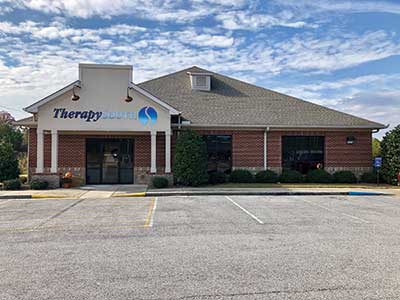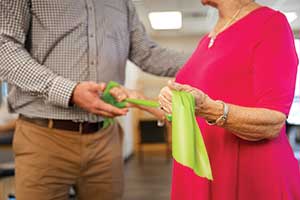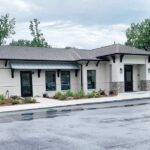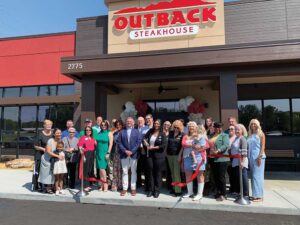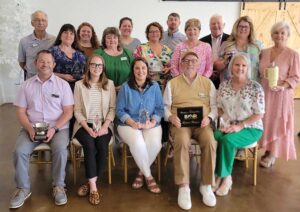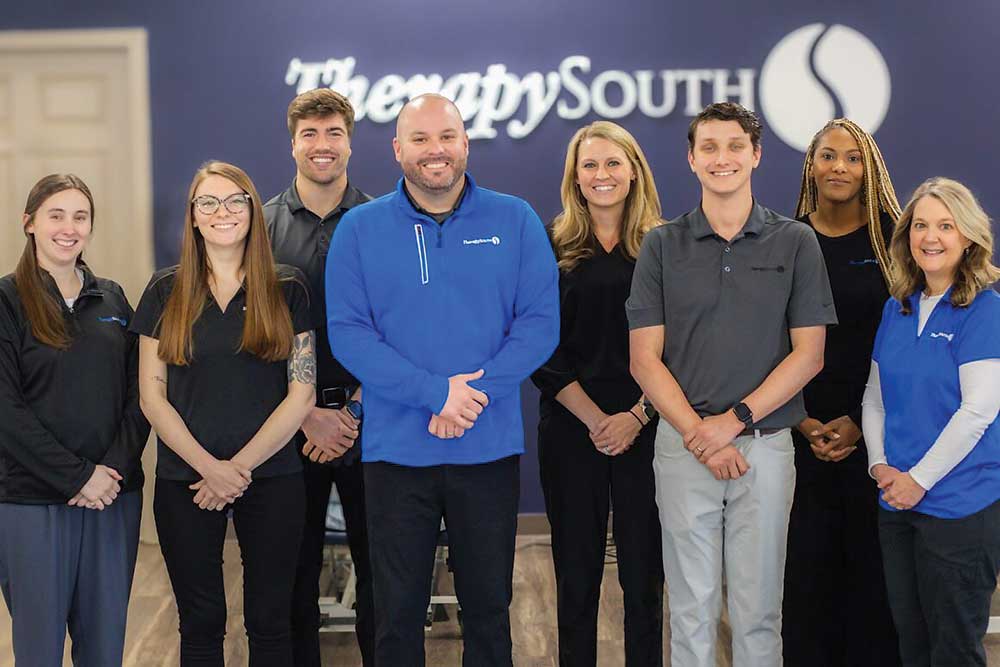
Therapy South adds to St. Clair medical community
Story by Paul South
Submitted Photos
High School catcher Tyler McGrady had his eye on the runner at first.
The runner broke for second. McGrady came up throwing, looking to nail the sliding runner. The catcher’s right elbow popped in pain. He knew something was wrong.
He was right.
Tommy John surgery and a year of intense rehab kept McGrady off the basepaths, instead putting him on a career path.
“I was in the therapist’s office more than I cared to at that time,” the Pell City native said. “But the impact of the therapy and the return to function drew me in.”
He elaborated. “I was drawn to medicine anyway, but just wasn’t sure which avenue I wanted to pursue,” McGrady said. “When you’re in high school or college and you’re an athlete, and you have an injury, your athleticism in that sport is kind of part of your identity as well. It’s tough to stomach that injury or being on the sideline or in the dugout.
“But just going through that process and rehabbing back, doing a lot of therapy, returning to throwing, all the way back to playing at the college level … The satisfaction you got from completing that process and being able to fully return (to baseball), seeing that firsthand is really what drew me to PT.”
Nearly two decades later, McGrady has 12 years’ experience as a physical therapist and serves as clinic director and partner at Therapy South in Pell City.
While most of us would define “athlete” within the narrow confines of the diamond, gridiron, track, court, course or pool, McGrady sees more broadly.
“There’s a saying that we use a lot of times,” McGrady said. “Everyone’s an athlete. Their sport is different. It may not be baseball or softball. It may be gardening or yardwork, skiing or whatever it is the patient wants to get back to. If we can help facilitate getting them back to something they want to do, that’s a validating feeling on our end.”
Physical therapy is a high demand, rapidly expanding profession in the United States. According to an April report from the Federal Bureau of Labor Statistics, employment of physical therapists is expected to grow 15 percent by 2034.
Closer to home, along with its clinic in Pell City, Therapy South also has a clinic in Gadsden. A second St. Clair County clinic is expected to open by year’s end. Nationwide, Therapy South is also expanding.
Baby Boomers are fueling the growth in physical and occupational therapy services, McGrady said.
“That’s the largest generation of people in the country that’s ever been,” he said. “There have to be enough practitioners to provide service for that many people coming through the system. That’s the growth of it.”
The profession, McGrady said, justifies its growth through evidence-based research. “What that does, is it allows us to make valid arguments to insurance companies, to physicians and to clients as well on the need and benefits of our service.”
A graduate of Jacksonville State who did his graduate work in physical therapy at Alabama State University, McGrady has also authored or co-authored scholarly articles for professional journals.
“It’s always important to learn and grow and to do more,” he said. “Any limitation of mine in the clinic is going to be passed on to my patient. So, I feel like it’s my responsibility to be up on the newer things and staying well versed so that I’m providing the best quality of care possible.”
Therapy South is an independent, faith-based, therapist-owned provider, with a nearly four-decade record of effectively treating patients in Pell City. The company now has 43 locations and is expected to grow to 46 by year’s end.
The Pell City clinic has six physical therapists and one occupational therapist.
“We don’t have any deals with anybody,” McGrady said. “We’re completely stand alone. All of our (location) owners – including myself — are still physical therapists and the majority of them treat patients in clinic every day. We really like that about Therapy South.”
He added, “We believe we’ve been given success by God, and it’s important for us to be good stewards of that success and grow and give people opportunities into the future.”
For McGrady, this work is a calling. “We’re all called to something,” he said. “If you are lucky enough to find that purpose and make a career out of it, I think that’s a really special thing.”
The company also mentors young and aspiring therapists.
“We spend a lot of time at Therapy South trying to identify younger people who will come in and do observation hours with us and try to develop relationships with them and find the right person that we want to grow with. You can teach a good person how to be a good therapist, but you can’t always teach a good therapist how to be a good person.”
In Alabama, the profession experienced a “huge” change this past June, McGrady said. In the past, physical and occupational therapists could not see patients without getting a physician referral. Now therapists have unrestricted patient access for up to 30 days.
“For the last 12 years, we could evaluate a patient, but without your physician providing a referral or providing oversight, we could not treat a patient. Now we have more unlimited access to patients.”
While technology has affected the entire medical profession in recent years – making it easier to schedule appointments, etc. – there’s no substitute for the hands-on treatment at the heart of physical and occupational therapy.
“There’s something valuable about being able to put hands on patients and really evaluate what’s going on, to provide that hands-on care,” McGrady said. “At Therapy South, we spend tons of money trying to make our clinicians the best we can so that they are doing the best they can to get our patients better as soon as possible.
“That’s the part that technology will never be able to replace,” McGrady added. “The old adage is that medicine is an art and a science. It’s tough to replace that balance with something like (artificial intelligence) or something that doesn’t have the human touch.”
In a competitive market, Therapy South is committed daily to doing its best for its patients. Most of its staff are homegrown, St. Clair County residents.
Thinking back, McGrady could not have foreseen his life’s work when his elbow blew out. But McGrady’s baseball setback provided lessons for his life and practice.
“Sports teaches a lot of lessons outside of how to throw and catch a ball. You learn how you’re going to respond to adversity. If you’re not the main guy, how are you going to respond to that? If you are the main guy, how are you going to respond to that? There are so many lessons to be learned on the field that correlate to later lessons in life. The lessons learned were more than worth it.”
His philosophy – and that of Therapy South – is simple.
“First and foremost, we’re called to love God and love people. If we treat everyone with respect, be a friend to them and listen to them … Just being able to spend time with patients is unique to therapy. Developing those personal relationships is unique to our profession.”
McGrady and his Therapy South colleagues are affirmed every day by their work, sometimes in sweet ways in keeping with small-town tradition.
“Every patient who comes in trusts you with their care. They come in four to six weeks later doing great. It’s really rewarding to improve someone’s life like that.”











